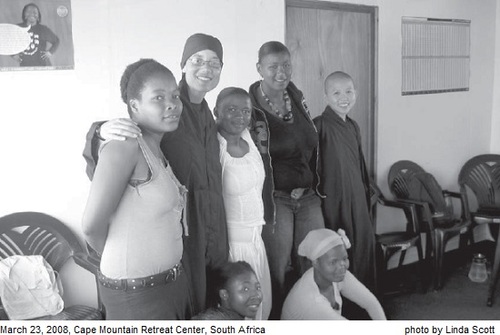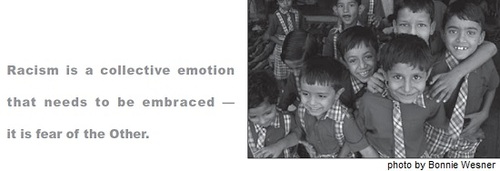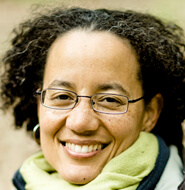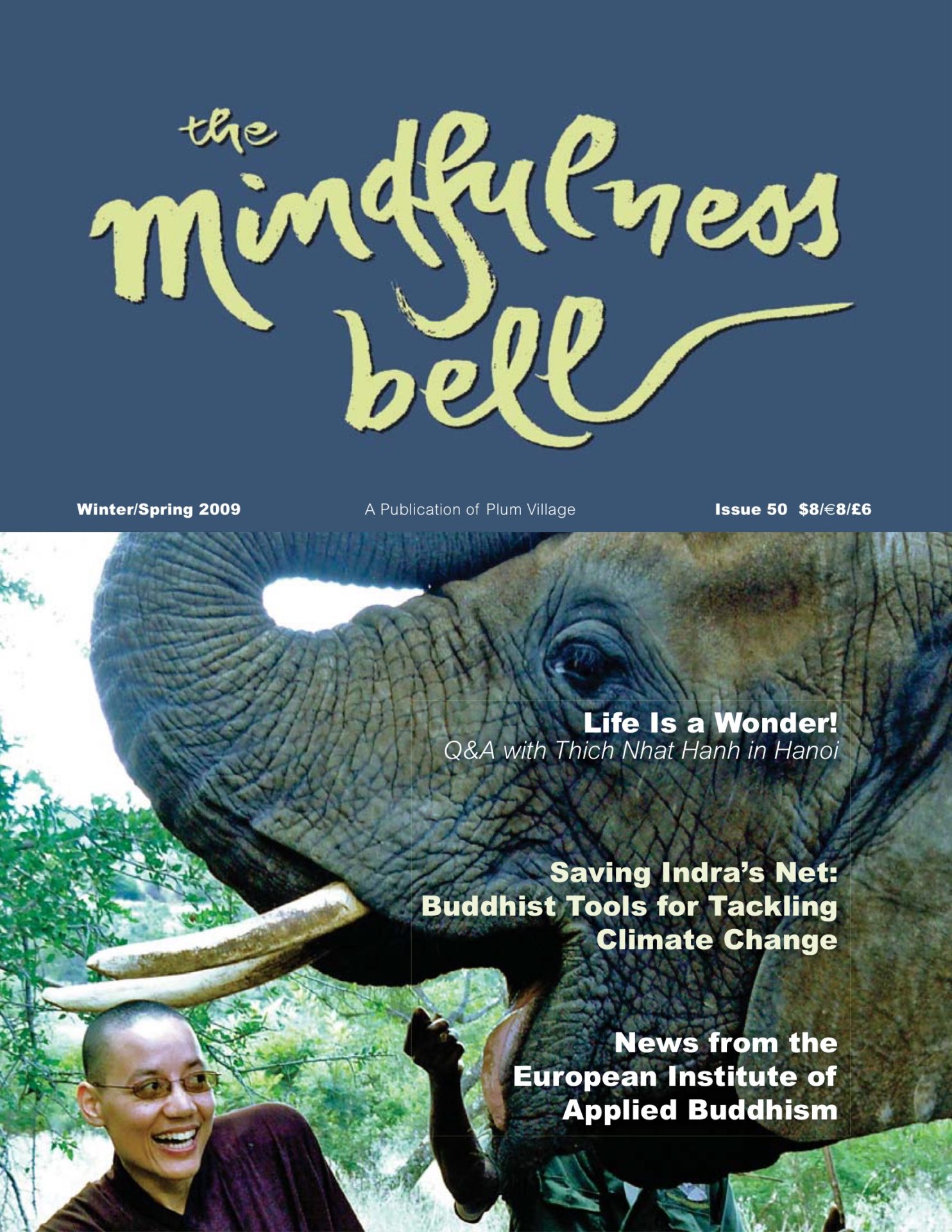By Kaira Jewel Lingo in February 2009
March 23, 2008,
Cape Mountain Retreat Center, South Africa
Happy Easter to everyone! Easter is the celebration of Christ’s resurrection — resurrection is coming back to life, starting over. We each have a chance to come back to life in every moment. When we come back to our breath, when we really come back to our steps,
By Kaira Jewel Lingo in February 2009
March 23, 2008,
Cape Mountain Retreat Center, South Africa
Happy Easter to everyone! Easter is the celebration of Christ’s resurrection — resurrection is coming back to life, starting over. We each have a chance to come back to life in every moment. When we come back to our breath, when we really come back to our steps, to the food we are putting in our mouths, to what we are drinking, to what we are saying, we have a chance to come back to life. We can be there in that moment and not be dead to the reality in front of us — not lost in thoughts and worries. The only moment we have is the present moment. It’s the only place where we can really be alive and touch life.
So as we celebrate Easter and the renewing of life, we can touch the resurrection of each of our lives. This retreat is a kind of coming back to life, to touch what is really good and true and beautiful in each of us, in our lineage, our ancestors, and descendants.
We can always begin anew and return to the goodness in us. The present moment contains the past and also the future. What is the present moment but a continuation of the past? What is the future but a continuation of this present moment?
What we do in this present moment is extremely important.

The past can be healed in the present moment; we don't have to worry about the future if we know how to dwell solidly in each breath, in each step.
The past is not separate from the present. What happened in the past still exists in us — things we have done and said, things that we may not have had control over, things that other people have done or said. In fact our cells carry memories. By dwelling deeply in the present moment, we can massage those things in our body and consciousness and liberate ourselves from the wounds of the past — individually and collectively.

Rediscovering Grandparents
I want to tell you a story of a time when I was able to heal wounds from my past. When I was not yet a nun, I went on a twenty-one-day retreat with my dad, led by Thay and the monastics in the U.S. He had been talking about the Five Touchings of the Earth and explained how we can heal our ancestors in us.
My father married my mother in the late nineteen-sixties. My mother is African-American. You know that my father [Dharma teacher Al Lingo] is European-American. My parents are black and white. My father’s parents were very upset. They never met my mother and they didn’t want to meet us when we were born (my brother is three and a half years older than me). When my parents divorced when I was seven or eight, my dad made contact again with my grandparents and we were able to visit them in Houston, Texas. I was eight when I first met them, and my brother was eleven. They were lovely and very warm to us. We were their only grandchildren. We visited them every year. Six years later, when I was fourteen, my granddad died. My grandmother passed away ten years after this so I got to be with her for another ten years. They were very kind to us. They helped my dad treat us to trips to amusement parks and they made sure we had all the foods we liked to eat.
I didn’t think too much about that experience growing up. I was at that retreat and one afternoon I went to the meditation hall to sit by myself and get in touch with my ancestors, as Thay had been teaching us. I just sat and began to breathe and think about my grandparents. A feeling of deep suffering came up towards my grandparents, a huge anger that they had excluded us from their life for eleven years. I felt a deep sense of rejection. I breathed with it as I had been learning to do. I embraced it; I allowed it space to be there. I cried and cried, and I held it with tenderness.
Healing Ancient Wounds
As that emotion was being lullabied by my breathing and my mindfulness, it began to calm. I began to think, “Well, why were they like that? Why did they close their hearts to us?” I saw that they were raised in a completely segregated South, totally white. My grandfather was poor growing up and he made it into the upper middle class through his own intelligence and hard work and lots of help from a society that supported him. But he was a product of all the seeds that were watered in him in that time and place. I saw how much he loved my brother and me and how much excluding us from his life had hurt him. I saw that he was stuck, he didn’t want to be that way, but he didn’t know how to be different. I was also very grateful that he was able to break out of this trap to some extent before he died and have a genuine relationship with his grandchildren.
In that moment, the past was very available to me. I stayed with my breathing, and my grandfather was resurrected in me. I felt so much love for my grandfather. I knew he wasn’t gone to me and that we were still very connected. I’m so proud that I am my grandfather’s granddaughter! There were so many things he was talented at; there was a lot of gentleness, wisdom, and compassion in him. I benefit from that and I want to carry that on. And I know that’s what he wants me to do. I feel a great deal of support and love from and for him now, and my anger and resentment that was buried in me for all those years is completely transformed.
When we really take care of ourselves in the present moment and listen to our own pain and suffering, listen as a mother listens to her child — with tenderness, compassion, openness, acceptance — we can understand our suffering and we can heal our past.
Making Time for our Ancestors
The practice of Touching the Earth can help our ancestors be resurrected in us and help us start afresh, because we have a chance that they may not have had. So when we speak about collective healing — healing the suffering of our nation and our people — we can do that by being very mindful of how we live in this present moment. Our ancestors are us, so whatever we do our ancestors are doing.
One practice that we encourage everyone to do is to set up an ancestors’ altar in your home and spend time there every day.
In Vietnam people have an ancestors' altar in their home; and anything of importance they report to their ancestors. When their child has his or her first day at school, the parents come before the altar, light a stick of incense, and let the ancestors know, “Today your grandchild or great-grandchild is going to school for the first time.” In many places throughout Africa, people do much the same thing.
It’s very healing to call upon our ancestors, because we are so much more than what we think; we are not this separate self.
When we can be in touch with this whole lineage of people who care about us, we have some energy. We don’t know where it comes from, but somehow we have energy to do things that we didn’t have energy to do before. We also have a sense of responsibility because we are aware of the expectations that our ancestors have of us and of the healing that they deeply need. So the choices that we make shift when that awareness deepens in us.
You could put a picture of your parents or your grandparents and just sit and breathe with your ancestors regularly. There is an illness in our society of isolation, loneliness, fear, the inability to connect to other people. When we can heal our connection to our ancestors, we’ll find more and more ways to make connections with people in our lives.
At times I can really touch my ancestors and I feel them very alive in me. They have a great sense of humor. They help me laugh at myself and not take myself too seriously. And they are full of love and compassion for me, too, when I am still enough to be available to them. They let me know that I will never be lost or abandoned, and they ask me to spend more time with them, to take more time to connect, to honor and remember them.
When we talk about healing collective suffering, collective trauma, it has to start with our own personal resurrection. To begin anew in history, to make a really different step as a human race, we start with being compassionate with our body, our mind, our ancestors, our family, our relationships.
The Pain of Exclusion
The experience on this retreat of exclusion, of feeling separate from the people in the village, I’m so grateful that it’s come up, painful and awkward and potentially volatile as it is. People have been coming here for some time and there wasn’t any event that brought the two groups together. Now this occasion of the village children being excluded from our bonfire last night has brought up the real suffering that exists, so we can’t go on with business as usual. It’s good that it’s painful, that this touches some deep suffering and confusion in us. It touches also a deep aspiration for things to change, for us to be able to connect and be free.
We have a chance to apply the practice — to take care of our own feelings, to speak mindfully with each other about it, and to look at how to respond with compassion. We don’t want to close our eyes before suffering, we don’t want to say “Well, that’s their business. We’re just here on retreat, why stir things up?”
Just as our own emotions need to be embraced, racism is a collective emotion that needs to be embraced — it is fear of the Other. We’re so used to thinking of discrimination as evil, so we don’t want to be associated with it. We know we are not like that! But we relate in the same way to our own difficult emotions — we push them away. Racism needs to be acknowledged and tenderly embraced as a collective. We have the compassion and wisdom, the Buddha seed in us, to look deeply at racism, classism, and all the various isms in us that tend to push others away.
We need to wake up together and look at it. People are already doing this in many places so it’s not something we have to create from scratch. The separation that exists in South Africa is no different from the separation that exists in other places. It may be felt quite acutely here, but it is everywhere. Our minds create the world. War and discrimination come from our minds. If we didn’t have violence in our minds, we wouldn’t create war.
The Grand Requiem Masses in Vietnam
I want to share about the Grand Requiem Masses that we did in Vietnam on our trip with Thay last year.
Thay returned to Vietnam for the first time in 2005. The Communist government thought he would cause an uprising against them, but he was so skillful and loving in his speech that they learned they didn’t need to fear him. Thay tenderly expressed the good qualities of the government and spoke very skillfully: “Why don’t you open up more? ... You can do better and this will make people happier.” Because of his skillfulness, people listened. He gave talks to members of the Communist Party, and Thay said to them, “You know, the monks and nuns, we don’t have our own private cars, cell phones, or bank accounts. We’re the true Communists!” And they laughed, they weren’t angry. He was able in a very loving way to touch the need in the Communist Party to reduce corruption and materialism. So they allowed us to come back in 2007.
One of the main reasons we went was to engage in ceremonies to heal the suffering of the war. The pain had been suppressed, it was not allowed to come up and be expressed. They were three-day ceremonies of healing where people wrote down the names of their loved ones who had been killed in the war or who had been killed escaping by boat. We performed ceremonies in the South in Saigon, in the Center in Hue, and in the North in Hanoi. There were huge altars with food and fruit, and then pages and pages stapled to the altars with the names of thousands of people — where and how they died, some of starvation, some killed in the forest, some from a land mine.
We began our chanting, inviting all these souls who had died violently in the war to be a part of this healing. And they came; we felt their presence. I was crying tears that weren't mine and many of us experienced something coming through us to be released — some pain that had been kept down and was able to be released on a collective level. We were encouraged to practice very uprightly, to really be mindful and kind, to be aware of our speech and actions, during those three days. Everyone had to make a special altar outside of their house, to pray for the healing of their family members who had died, and Thay gave talks every morning. I experienced the healing of my own blood and land ancestors in those ceremonies. On the third day of the ceremony, after quite a heat wave, it rained. It did that at each of the three ceremonies — on the last day it rained.
Transformation of the Collective
We can create spaces of healing and resurrection in our communities, by allowing pain to be expressed but held in a very tender, loving, compassionate container of mindfulness. When I first heard about these ceremonies in Vietnam, right away I thought, “Oh, we need these ceremonies in the U.S.” So much suffering is being passed on from one generation to the next. The absurdity of violence in the U.S., with ten-year-old children shooting classmates and teachers in school, is pain from ancestors that has not been healed. The brutality of this deep separation here in South Africa is pain that has not been addressed from our ancestors. If we can address and release that, our future generations will be free to live a very different kind of life
I’m thinking about how to do some kind of a spiritual healing ceremony that is appropriate for Americans to address the wounds of Native American genocide, slavery, segregation, the witch hunts, and other deep, national wounds. We can also think about this here. I want to invite us all to meditate together, particularly on the situation that has arisen in this retreat. It is clear that whatever we want to suppress will come up some how, some way. We are asked to walk around the village, but we end up meeting some children from the village on the detour we take to the meditation hall. We are so naturally attracted to them! The urge to separate, it can never win! We want to connect; we want to love each other. It’s so natural, so human.
I was very happy to hear some of you share before the walking meditation about how important it is to be skillful and look deeply — not just act out of our goodwill and good intention — but to really think about the best response to this difficult situation.
It’s just not true that we aren’t connected to the colored people in the village. It’s just not true that it doesn’t matter what happens, that we can go about our retreat here and not be impacted by that kind of inequality. To see this, that’s the practice.
Maybe we can find a way as a community to make a true and deep response to this suffering. We know the farmer feels it, the retreat caretakers feel it, the villagers feel it. Everyone is victimized by this kind of separation. Everyone is crippled somehow by this narrow heart, the inability to include. I hope that out of this retreat, we will have a beautiful, strong Sangha that meets regularly in Cape Town. We have a meeting Monday night to be together and offer our support to creating a Sangha. So we can continue to look at how we can respond to this on Monday night.
I want to close by expressing my gratitude to all of you for being here, for having the courage to come on this retreat — for having the willingness to love, to open yourself up to transformation for yourself, your family, your society. All of us who have come here feel enriched and grateful for this time with you.


